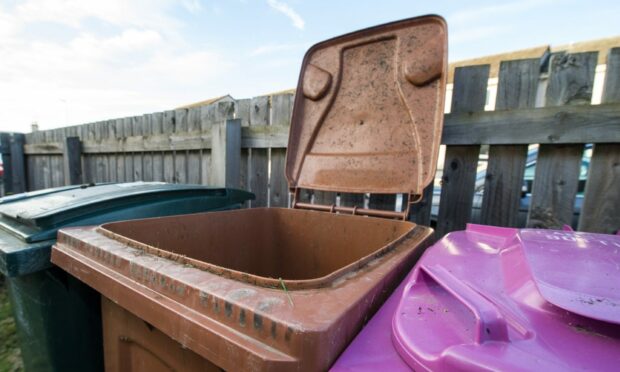Sir, – In response to Colin Johnson (Letters, February 25), and two bins in Banchory going up to three.
In Moray I have no fewer than five bins: green for landfill; blue for paper; pink for recycling; brown for food waste and garden waste – if garden waste is included the cost is £40 annually. There’s also an orange tub for glass.
I don’t have any problem with sorting my rubbish.
Our council do a great job – it’s the general public dropping litter along the roadside that is my complaint. Take your litter home. On windy days put a brick on your bin to prevent it blowing over.
It’s simple common sense.
Grace Hendry, Moray.
Joined-up thought needed on services
Sir, – Chris Deerin’s article of January 25, was sad, emotive and informative but lacking in future vision.
No one will deny that the NHS in all its guises has had a hard time during Covid. Getting a GP appointment in a reasonable time is not a new problem but it has been exacerbated by Covid.
All areas of the UK have undergone the transition from family GP to what we have now. Most of us elderly bemoan the loss of personal contact and find it difficult reconciling our health issue when we see a different person at every visit.
Over the years various reasons have been put forward by users: number of GPs per practice has not kept up with the growth of the town, doctors retiring early from a very stressful career, not enough training places for new doctors.
It would be easy to say that it is totally a funding issue but I believe that the main reason is no joined-up thinking.
Let’s start with growth in our towns. Planning permission is being granted by local authorities with no consideration to all the support services required ie bin men, GPs, dentists, police, social workers, sewerage, teachers, care workers, ambulance services.
I’m sure there are others just as important that I haven’t mentioned. So every time a new housing estate appears all the support services are playing catch-up.
Consequently all residents old and new suffer services which were struggling before the increased workload. As an example of joined-up thinking, the council should determine the increase in population that any new application is likely to bring. It then consults with all who offer services in the area and makes a determination of the extra manpower each of those services will require. That list is sent to the appropriate
government departments who add the information to their projected housing requirement.
The government collates all the information from different local authorities and organises funding for the various training establishments and for local authorities to employ more council employees.
I know most will moan that it will take years to filter through (ask yourself why successive governments have not been doing this for years) but we have to start somewhere. As for the politicians looking for a new way “to stop people (patients) clogging up GP services unnecessarily”, may I suggest that the GPs, who should know their patients better than any politician, decide if a person is likely to struggle with technology then that person will be seen in person?
The number requiring this will drop in time for the obvious reason.
Finlay G Mackintosh, Lochview, Forres.
‘Union of equals’ is anything but
Sir, – Our unionist-supporting contributors seem deeply concerned that support for independence is again rising.
The fact is that our “Union of equals” has been found to be anything but by many. It is, however, true to say that we are “all in this together” – up to our necks in it, and it doesn’t smell nice.
You may not like the fact that an increasing number seek change but it appears many feel that it is time.
Ron Campbell, Richmond Walk, Aberdeen.
